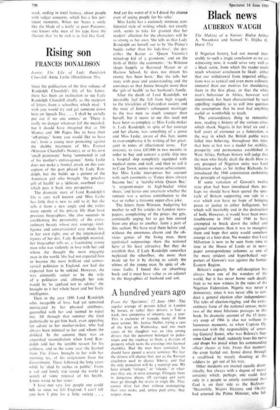Jennie: The Life of Lady Randolph Churchill Anita Leslie (Hutchinson
50s)
Rising son
FRANCES DONALDSON
Since the publication of the first volume of Randolph Churchill's life of his father, there has been an inclination to see Lady Randolph Churchill chiefly as the recipient of letters from a schoolboy which read: 'I wish you would try and get someone down here on Speech Day .. . I shall be awfully put out if no one comes,' or `There is really no danger whatever [of the measles]. but I should have imagined that as 300 Mamas and 300 Papas like to have their "offsprings" home you would like to have me'; from a young man protesting against the shabby treatment of Mrs Everest (Winston Churchill's Nanny), or at his own 'small patrimony' being 'summoned in aid of his mother's extravagance.' Anita Leslie does not make a frontal attack on this con- ception of the part played by Lady Ran- dolph. but she builds up a picture of the American girl who brought 'the priceless gift of health' to a 'delicate, overbred race' which puts it back into perspective.
The dramatic story of Lord Randolph's lift is very well known and Miss Leslie has little that is new to add to it; but she tells it from a new angle and she writes more openly of his private life than have previous biographers. She also succeeds in establishing the personality of the extra- ordinary beauty whose zest, courage, intel- ligence and conversational ease made her, in her own right, one of the international figures of her day. Lady Randolph married, her biographer tells us, a fascinating young man who was violently in love with her and whom she thought the most engaging man in the world. She had not expected.him to become the most brilliant and contro- versial politician in England. nor had she expected him to be unkind. However, she was eminently suited to be the wife of a politician and, although her role would be `to applaud not to advise,' she brought to it her whole heart and her lively intelligence.
Then in the year 1886 Lord Randolph who. incapable of love. had yet remained intoxicated by her physical attributes. quarrelled with her and seemed to reject her. All through that summer she tried pathetically to get him back, even appealing for advice to her mother-in-law, who had always been inimical to her and whom she disliked. In the autumn there was an anguished reconciliation when Lord Ran- dolph told her the terrible reason for his coldness. and in the same year she learned from The Times, brought to her with her morning tea, of his resignation from the Government. There followed the long years while he 'died by inches in public.' From a sad and lonely trip round the world in search of some renewal of his health. Jennie wrote to her sister: I have met very few people one could talk to since we left England. I can't tell you how I pine for a little society . . . And yet the worst of it is I dread the chance even of seeing people for his sake.'
Miss Leslie has a curiously intimate, con- fidential style of writing which, not exactly arch, seems to take for granted that her readers' affection for the characters will be as strong as her own. She tells us that Lady Randolph set herself out to be 'the Prince's buddy rather than his lady-love'; she des- cribes the Kaiser as 'Queen Victoria's mixed-up kid of a grandson.' and on the birth of Hitler she comments: 'As Winston sleeps happily at Banstead Manor or at Harrow School, he does not dream his enemy has been born.' But she tells her story with pace and understanding and she convinces us that Jennie brought more than the 'gift of health' to her husband's family.
After the death of Lord Randolph. we inevitably feel the fall from high tragedy to the trivialities of Edwardian society and the story of Jennie's subsequent marriages to the two men so much younger than herself, but it seems to me this need not have been so complete as Miss Leslie makes it. Lady Randolph. in spite of her courage and her charm, was something of a goose and Miss Leslie. aware of this fact, seems to over-emphasise it by writing of her great- aunt in tones of affectionate irony. For instance, to raise £45,000 in two months in order to buy and convert a cattle ship into a hospital ship completely equipped with medical stores and staff, and then to sail it to Cape Town, seems no mean achievement; but Miss Leslie intersperses her account
with such comments as 'Fancy dress always became her.' a 'starchy-white Queen Bee,' 'a sergeant-major in high-heeled white shoes.' and leaves one uncertain whether the venture was a serious contribution to the war or rather a tiresome upper-class joke. The letters from Winston, badgering his mother to sell his articles to London news- papers, complaining of the prices she gets.
continually urging her to get him moved from one place to another, form a part of this section. We have read them before and, without the enormous charm and the ob- vious genius of the living man, these egotistical outpourings show the national hero at his least attractive. But they do establish that, if Lady Randolph somewhat neglected the schoolboy, she more than made up for it by slaving to satisfy the whims of the young man. In spite of ob- vious faults. I found this an absorbing book and it must have value as an adjunct to the biographies of husband and son.


































 Previous page
Previous page